2020-2021学年人教版英语 七年级下册 Unit10 I'd like some noodles. SectionA grammar 课件(共28张PPT)
文档属性
| 名称 | 2020-2021学年人教版英语 七年级下册 Unit10 I'd like some noodles. SectionA grammar 课件(共28张PPT) |  | |
| 格式 | ppt | ||
| 文件大小 | 3.2MB | ||
| 资源类型 | 教案 | ||
| 版本资源 | 人教新目标(Go for it)版 | ||
| 科目 | 英语 | ||
| 更新时间 | 2021-05-21 22:31:33 | ||
图片预览

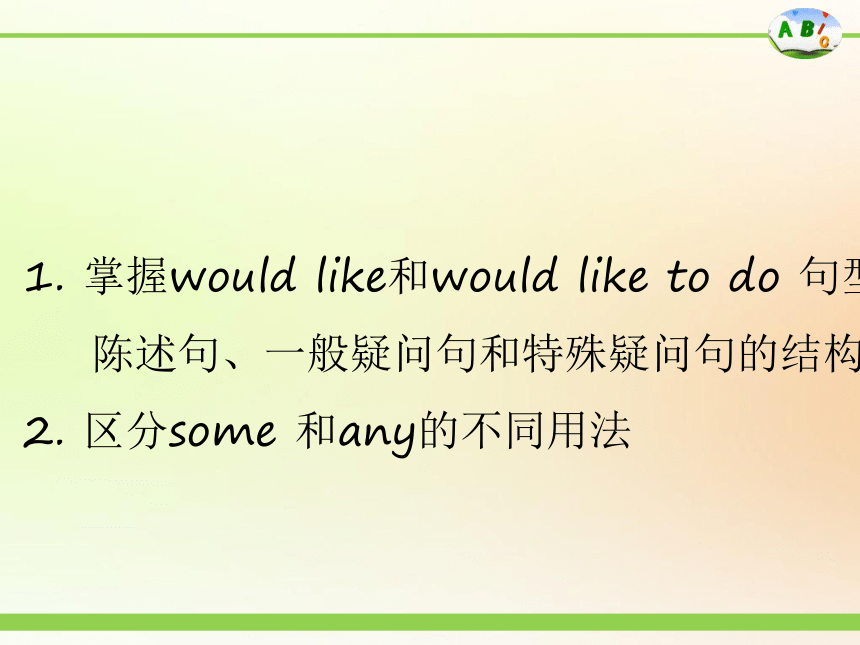
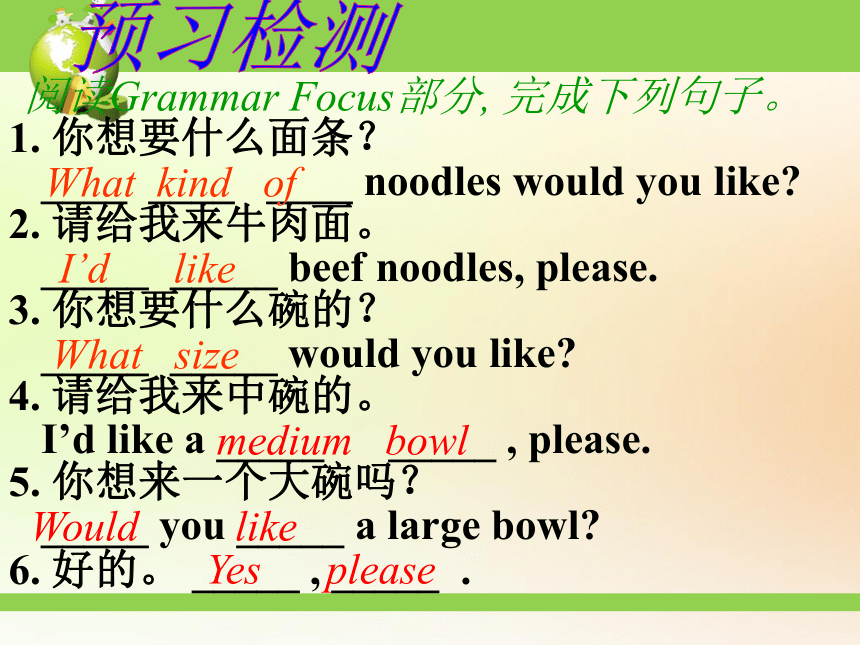
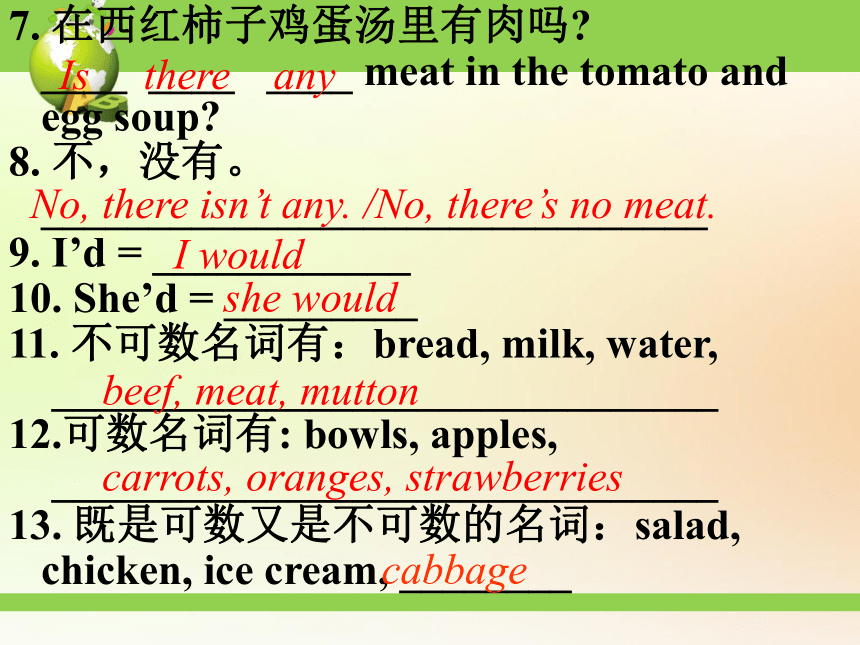
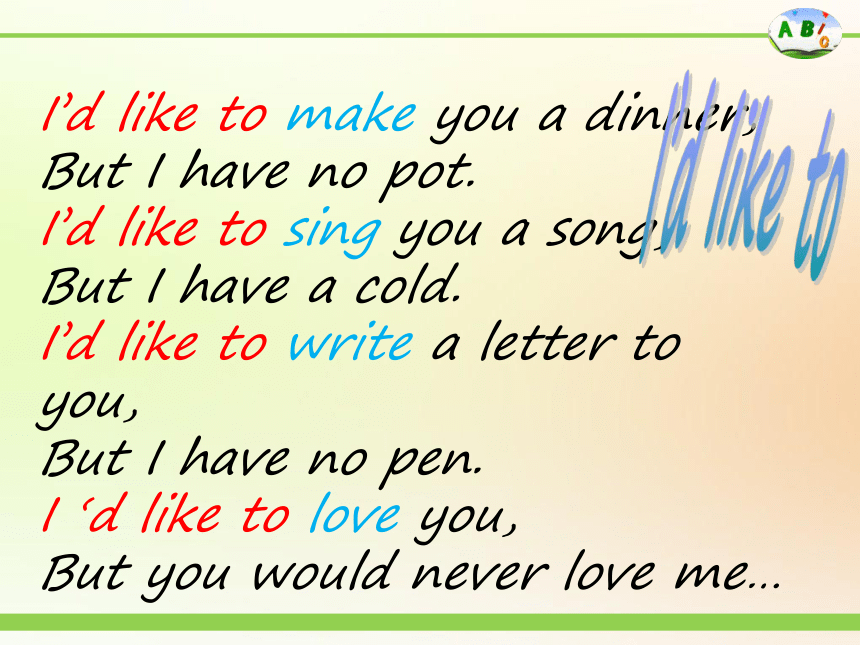
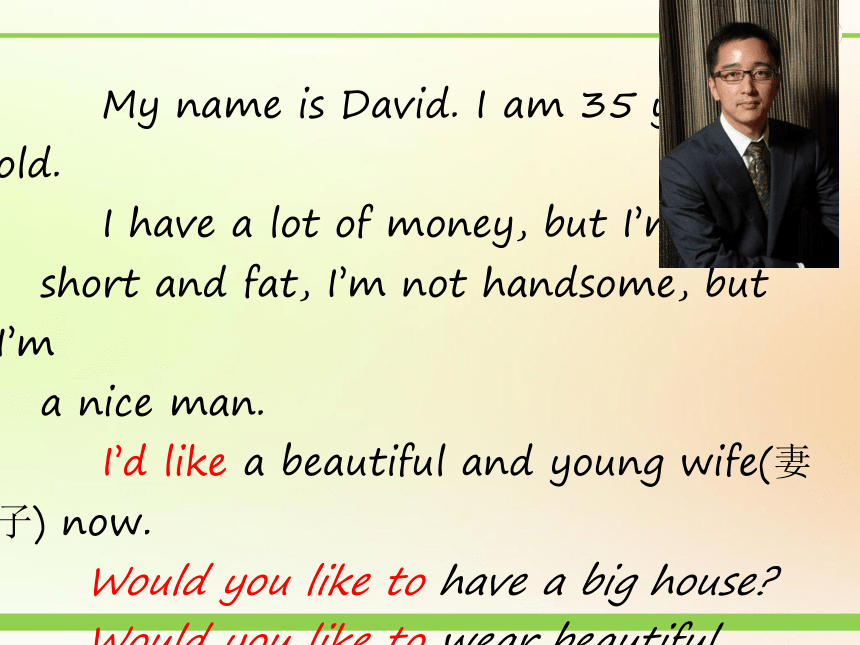
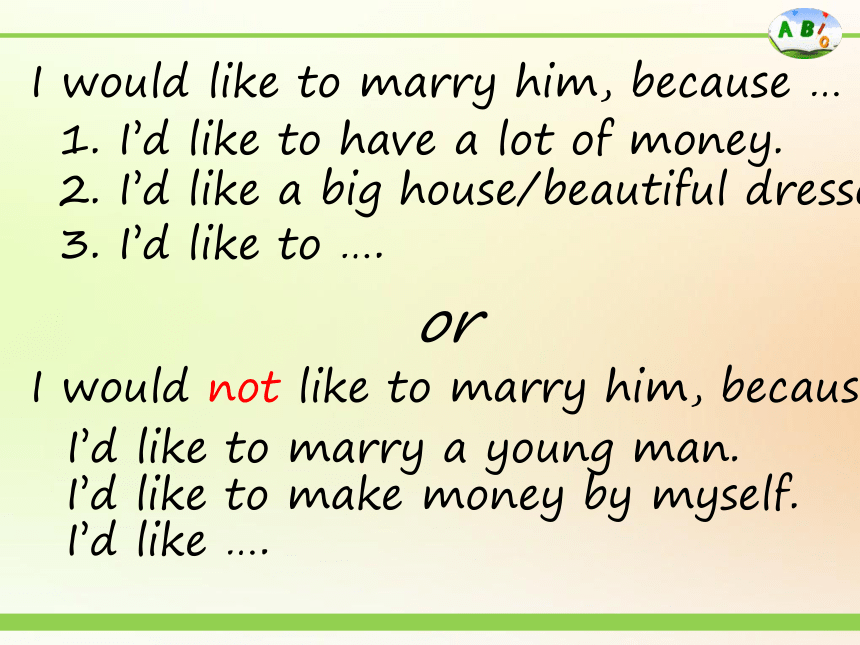
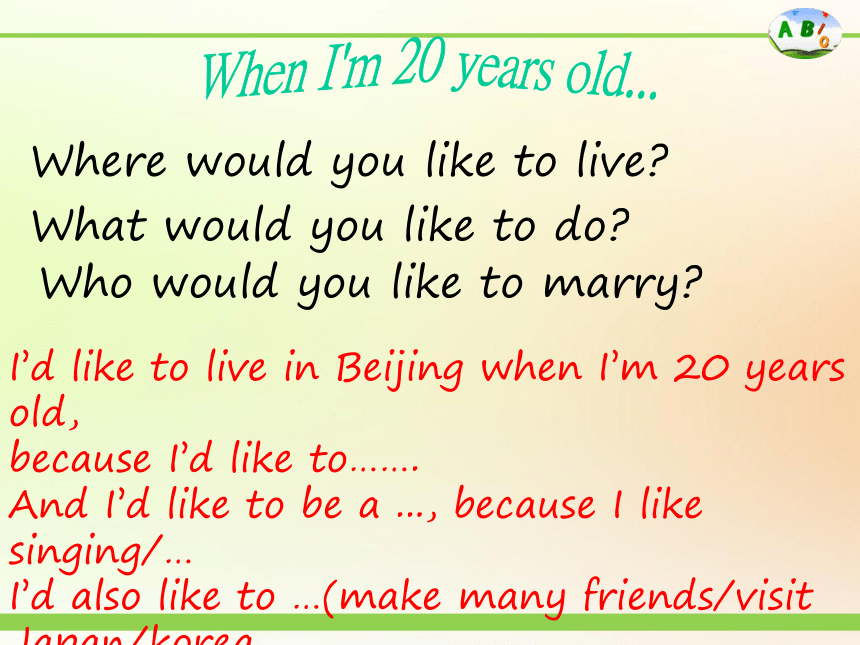
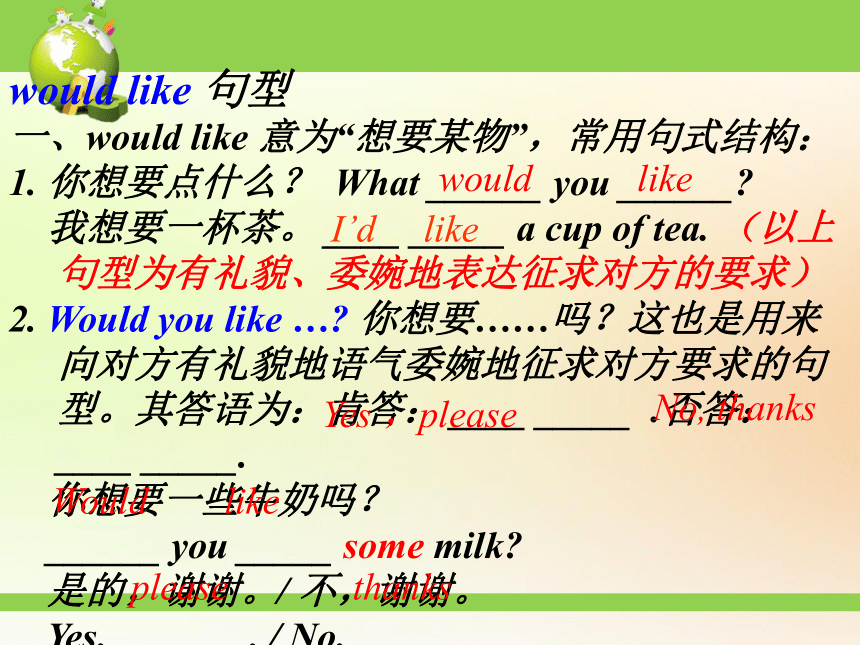
文档简介
(共28张PPT)
Unit
10
I’d
like
some
noodles.
Section
A
Grammar
Focus
掌握would
like和would
like
to
do
句型的
陈述句、一般疑问句和特殊疑问句的结构
2.
区分some
和any的不同用法
1.
你想要什么面条?
____
____
____
noodles
would
you
like?
2.
请给我来牛肉面。
_____
_____
beef
noodles,
please.
3.
你想要什么碗的?
_____
_____
would
you
like?
4.
请给我来中碗的。
I’d
like
a
_____
_____
,
please.
5.
你想来一个大碗吗?
_____
you
_____
a
large
bowl?
6.
好的。
_____
,
_____
.
阅读Grammar
Focus部分,
完成下列句子。
I’d
like
What
kind
of
What
size
预习检测
medium
bowl
Would
like
Yes
please
7.
在西红柿子鸡蛋汤里有肉吗?
____
____
____
meat
in
the
tomato
and
egg
soup?
8.
不,没有。
_______________________________
9.
I’d
=
____________
10.
She’d
=
_________
11.
不可数名词有:bread,
milk,
water,
_______________________________
12.可数名词有:
bowls,
apples,
_______________________________
13.
既是可数又是不可数的名词:salad,
chicken,
ice
cream,
________
I
would
No,
there
isn’t
any.
/No,
there’s
no
meat.
she
would
Is
there
any
beef,
meat,
mutton
cabbage
carrots,
oranges,
strawberries
I’d
like
to
make
you
a
dinner,
But
I
have
no
pot.
I’d
like
to
sing
you
a
song,
But
I
have
a
cold.
I’d
like
to
write
a
letter
to
you,
But
I
have
no
pen.
I
‘d
like
to
love
you,
But
you
would
never
love
me…
I’d
like
to
My
name
is
David.
I
am
35
years
old.
I
have
a
lot
of
money,
but
I’m
kind
of
short
and
fat,
I’m
not
handsome,
but
I’m
a
nice
man.
I’d
like
a
beautiful
and
young
wife(妻子)
now.
Would
you
like
to
have
a
big
house?
Would
you
like
to
wear
beautiful
dresses?
Would
you
like
a
lot
of
money?
If
your
answer
is
yes,
would
you
like
to
marry
me?
I
would
like
to
marry
him,
because
…
1.
I’d
like
to
have
a
lot
of
money.
2.
I’d
like
a
big
house/beautiful
dresses….
I
would
not
like
to
marry
him,
because
…
I’d
like
to
marry
a
young
man.
I’d
like
to
make
money
by
myself.
I’d
like
….
or
3.
I’d
like
to
….
Where
would
you
like
to
live?
What
would
you
like
to
do?
Who
would
you
like
to
marry?
When
I'm
20
years
old...
I’d
like
to
live
in
Beijing
when
I’m
20
years
old,
because
I’d
like
to…….
And
I’d
like
to
be
a
...,
because
I
like
singing/…
I’d
also
like
to
…(make
many
friends/visit
Japan/korea
I’d
like
to
…
Group
work(合作探究)
would
like
句型
一、would
like
意为“想要某物”,常用句式结构:
1.
你想要点什么?
What
______
you
______?
我想要一杯茶。
____
_____
a
cup
of
tea.
(以上句型为有礼貌、委婉地表达征求对方的要求)
2.
Would
you
like
…?
你想要……吗?这也是用来向对方有礼貌地语气委婉地征求对方要求的句型。其答语为:肯答:
____
_____
.否答:
____
_____.
你想要一些牛奶吗?
______
you
_____
some
milk?
是的,谢谢。/
不,谢谢。
Yes,
_______.
/
No,
_____
would
like
I’d
like
Would
like
please
thanks
Yes
,please
No,
thanks
【拓展】Would
you
like
to
do
sth.?
你愿意做某事吗?用来有礼貌地向对方提出建议或邀请的句型。答语常为“Yes,
I’d
like/love
to.”
Sorry,
…”
eg:
你愿意和我们一起去划船吗?
______
you
____
to
____
boating
with
us?
二、Is
there
any
sth.
in…?在什么里面有什么吗?
肯答:
____
_____
____
;否答
:____
_____
____
_____
/
____
_____
____
_____
eg:
Is
there
any
meat
in
the
tomato
and
egg
soup?(做否定回答)
____
_____
____
_____
____
_____
____
_____
Would
like
go
Yes,
there
is.
No,
there
No,
there’s
no
meat.
isn’t
any.
No,
there’s
no
meat.
No,
there
isn’t
any.
三、可数名词与不可数名词
可数名词:可数名词有单数、复数之分。其复数形式一般要加-s或-es。
如:potato
—
_________;
tomato
—__________
2.
不可数名词没有复数形式,只有单数形式。如:
some
______
(米饭);a
lot
of
_____
(牛肉)
(1)不可数名词表示数量的多少时,必须与表示数量的名词连用,即“数词
+
表示数量的名词(可数名词)+
of
+
不可数名词”。
如:两玻璃杯果汁
_____
________
of
juice
三碗米饭
_______
______
of
rice
(2)
不可数名词做主语时,谓语动词只能用单数形式。如:在碗里有一些羊肉汤。
There
___
______
mutton
soup
in
the
bowl.
potatoes
tomatoes
rice
beef
two
glasses
three
bowls
is
some
Would
you
like.
.
.
?
句型的答语:
肯定回答常用
否定回答常用
在回答Would
you
like
to
do
sth.
?
时,
肯定回答常用
否定回答常用
Yes,
please
No,
thanks
Yes,
I’d
like
to
/Sure,
I’d
like
to
I’d
like
to,
but…
Discuss!
1.冰箱里有一些牛奶。
2.牛肉汤里有一些西红柿。
There
is
some
milk
in
the
fridge.
There
isn’t
any
milk
in
the
fridge.
There
are
some
tomatoes
in
the
beef
soup.
There
aren’t
any
tomatoes
in
the
beef
soup.
some和any的用法
Language
points
some和any
既可以修饰可数名词又可以修
饰不可数名词,
some常用在肯定句中,
而
any则常用在否定和疑问句中。所以,
some
和
any
的区别在于:
some和any
的用法主要
是考虑用在肯定句、疑问句还是否定句中,
与名词的可数与否无关。
1
some的用法:
some意为“一些”,可作形
容词和代词。它常修饰可数名词复数。
如:some
books
一些书,
some
boys
一些男孩,
也可修饰不可数名词:
some
water
一些水,some
tea
一些茶叶,
2
some
常用在肯定句中。
any的用法:
any意为“任何一些”,它也
可修饰可数名词复数或不可数名词,常
用于疑问句和否定句。如:
3
我没看见茶叶。
I
can’t
see
any
tea.
你在学校有些朋友吗?
Do
you
have
any
friends
at
school?
【探究点三】名词作定语
tomato
noodles
西红柿面
potato
soup
土豆汤
仿照翻译:一棵苹果树_________________
两棵苹果树_______________
一位男/女老师______________
【我的结论】名词修饰名词时,起修饰作用的名词通常用____________
数。但下列情况特殊:
两位男/女老师_______________________
一个运动俱乐部_________________________
三个运动俱乐部_____________________
一个服装店_______________
许多服装店_________________
an
apple
tree
two
apple
trees
a
man
/woman
teacher
单
two
men
/women
teachers
a
sports
club
three
sports
clubs
a
clothes
shop
many
clothes
shops
May
I
have
your
order?
___
2.
What
kind
of
noodles
would
you
like?
____
3.
We
have
beef,
chicken,
mutton,
cabbage,
potato,
tomato
…
___
4.
Yes,
there
are
some
carrots.
____
5.
Sure.
What
size
would
you
like?
___
6.
We
have
large,
medium
and
small
bowls.
___
a
d
f
c
e
b
Complete
the
conversation
below.
3a
a.
What
kind
of
noodles
do
you
have?
b.
Oh,
a
medium
bowl,
please.
c.
OK,
I’d
like
the
mutton
noodles
then.
d.
I’d
like
some
noodles,
please.
e.
What
sizes
do
you
have?
f.
Are
there
any
vegetables
in
the
mutton
noodles?
3b
Write
questions
and
answers
using
the
words
in
brackets.
1.
What
kind
of
noodles
would
you
like?
___________________________________
___________________________________
___________________________________
(kind)
(chicken/beef/tomatoes)
I’d
like
chicken,
beef
and
tomato
noodles./
I’d
like
chicken
and
beef
noodles
with
tomatoes.
2.
_________________________________
___________________________________
3.
_________________________________
___________________________________
(size)
(medium)
(any/cabbage/beef
noodles)
(no)
What
size
would
you
like?
I’d
like
a
medium
bowl,
please.
Is
there
any
cabbage
in
the
beef
noodles?
No,
there
isn’t
any.
3c.
Work
in
small
groups.
Find
out
who
would
like
the
food
below.
Write
their
names
on
the
cards
above
the
food.
A:
Anna,
what
would
you
like
to
eat?
B:
I’d
like
beef
noodles
with
carrots.
一、请从A.
B.
C.
D四个选项中选出最佳答案
(
)
1.
---
Would
you
like
a
cup
of
coffee?
---
_______
A.
Yes,
please.
B.
Yes,
I
would.
C.
No,
please.
D.
No,
I
don’t.
(
)
2.
---
Would
you
like
some
drinks,
boys?
----
Yes,
________
please.
A.
some
oranges
B.
two
boxes
of
chocolates
C.
some
cakes
D.
two
cups
of
orange
(
)
3.
There
are
two
hundred
__________
in
that
supermarket.
A.
woman
workers
B.
women
worker
C.
women
workers
D.
woman
workers
(
)
4.
May
I
have
____,
please?
A.
a
meat
B.
some
beef
C.
a
piece
beef
D.
a
beef
(
)
5.
There
are
a
lot
of
_____
in
the
kitchen.
A.
potatoes
B.
beef
C.
chicken
D.
meat
A
D
C
B
A
(
)
6.
A
small
bowl
of
noodles
_______
not
enough.
A.
are
B.
is
C.
am
D.
be
(
)
7.
I’d
like
______
for
dinner.
A.
two
cup
of
coffee
B.
three
piece
of
bread
C.
a
bowl
of
dumplings
D.
three
glasses
of
milks
(
)
8.
Julia
would
like
_______
TV.
A.
watch
B.
watches
C.
watching
D.
to
watch
(
)
9.
I
like
_______
a
lot,
and
my
mother
often
cooks
it
in
different
ways.
A.
fish
B.
potatoes
C.
noodles
D.
chickens
(
)
10.
----
Would
you
like
to
have
another
cup
of
coffee?
----
Yes,
_________.
A.
I
would
want
B.
I
would
like
C.
I’d
like
to
D.
I’d
love
B
C
D
A
C
句型转换
1.
I’d
like
some
chicken.
(对画线部分提问)
you ?
2.
He’d
like
beef
noodles.
(对画线部分提问)
noodles he
like?
3.
John
would
like
a
medium
bowl
of
rice.
(对画线部分提问)
bowl
of
rice
would
John
like?
4.
Tom
wants
some
mutton.
(改为同义句)
Tom
some
mutton.
5.
There
is
a
story
book.
(改为一般疑问句)
a
story
book?
What
would
like
What
kind
of
would
What
size
would
like
Is
there
1.
我不喜欢汉堡包、比萨和冰茶。
I
_____
_____
hamburgers,pizza
______
ice
tea.
2.
你喜欢什么类型的茶?
________
________
of
tea
would
you
like?
3.
我们也有色拉,
也有橘汁和苏打。
We
______
have
salad
____
____
____
orange
juice
and
soda.
4.
他想要一个牛肉的中碗的面条。
He’d
like
a
____
bowl
of
noodles____
_____.
5.
让我们列一份菜单吧!
Let’s
______
____
______!
don’t
like
What
kind
as
well
as
or
also
medium
with
beef
make
a
menu
Homework
Make
a
survey.
Ask
what
your
class
eat
at
school/at
home.See
if
they
eat
healthy
food.(调查同学们的日常饮食,判断是否健康.)
2.Read
and
learn
the
conversation
we’ve
learnt.(朗读并背诵所学对话.)
Thank
you!
Unit
10
I’d
like
some
noodles.
Section
A
Grammar
Focus
掌握would
like和would
like
to
do
句型的
陈述句、一般疑问句和特殊疑问句的结构
2.
区分some
和any的不同用法
1.
你想要什么面条?
____
____
____
noodles
would
you
like?
2.
请给我来牛肉面。
_____
_____
beef
noodles,
please.
3.
你想要什么碗的?
_____
_____
would
you
like?
4.
请给我来中碗的。
I’d
like
a
_____
_____
,
please.
5.
你想来一个大碗吗?
_____
you
_____
a
large
bowl?
6.
好的。
_____
,
_____
.
阅读Grammar
Focus部分,
完成下列句子。
I’d
like
What
kind
of
What
size
预习检测
medium
bowl
Would
like
Yes
please
7.
在西红柿子鸡蛋汤里有肉吗?
____
____
____
meat
in
the
tomato
and
egg
soup?
8.
不,没有。
_______________________________
9.
I’d
=
____________
10.
She’d
=
_________
11.
不可数名词有:bread,
milk,
water,
_______________________________
12.可数名词有:
bowls,
apples,
_______________________________
13.
既是可数又是不可数的名词:salad,
chicken,
ice
cream,
________
I
would
No,
there
isn’t
any.
/No,
there’s
no
meat.
she
would
Is
there
any
beef,
meat,
mutton
cabbage
carrots,
oranges,
strawberries
I’d
like
to
make
you
a
dinner,
But
I
have
no
pot.
I’d
like
to
sing
you
a
song,
But
I
have
a
cold.
I’d
like
to
write
a
letter
to
you,
But
I
have
no
pen.
I
‘d
like
to
love
you,
But
you
would
never
love
me…
I’d
like
to
My
name
is
David.
I
am
35
years
old.
I
have
a
lot
of
money,
but
I’m
kind
of
short
and
fat,
I’m
not
handsome,
but
I’m
a
nice
man.
I’d
like
a
beautiful
and
young
wife(妻子)
now.
Would
you
like
to
have
a
big
house?
Would
you
like
to
wear
beautiful
dresses?
Would
you
like
a
lot
of
money?
If
your
answer
is
yes,
would
you
like
to
marry
me?
I
would
like
to
marry
him,
because
…
1.
I’d
like
to
have
a
lot
of
money.
2.
I’d
like
a
big
house/beautiful
dresses….
I
would
not
like
to
marry
him,
because
…
I’d
like
to
marry
a
young
man.
I’d
like
to
make
money
by
myself.
I’d
like
….
or
3.
I’d
like
to
….
Where
would
you
like
to
live?
What
would
you
like
to
do?
Who
would
you
like
to
marry?
When
I'm
20
years
old...
I’d
like
to
live
in
Beijing
when
I’m
20
years
old,
because
I’d
like
to…….
And
I’d
like
to
be
a
...,
because
I
like
singing/…
I’d
also
like
to
…(make
many
friends/visit
Japan/korea
I’d
like
to
…
Group
work(合作探究)
would
like
句型
一、would
like
意为“想要某物”,常用句式结构:
1.
你想要点什么?
What
______
you
______?
我想要一杯茶。
____
_____
a
cup
of
tea.
(以上句型为有礼貌、委婉地表达征求对方的要求)
2.
Would
you
like
…?
你想要……吗?这也是用来向对方有礼貌地语气委婉地征求对方要求的句型。其答语为:肯答:
____
_____
.否答:
____
_____.
你想要一些牛奶吗?
______
you
_____
some
milk?
是的,谢谢。/
不,谢谢。
Yes,
_______.
/
No,
_____
would
like
I’d
like
Would
like
please
thanks
Yes
,please
No,
thanks
【拓展】Would
you
like
to
do
sth.?
你愿意做某事吗?用来有礼貌地向对方提出建议或邀请的句型。答语常为“Yes,
I’d
like/love
to.”
Sorry,
…”
eg:
你愿意和我们一起去划船吗?
______
you
____
to
____
boating
with
us?
二、Is
there
any
sth.
in…?在什么里面有什么吗?
肯答:
____
_____
____
;否答
:____
_____
____
_____
/
____
_____
____
_____
eg:
Is
there
any
meat
in
the
tomato
and
egg
soup?(做否定回答)
____
_____
____
_____
____
_____
____
_____
Would
like
go
Yes,
there
is.
No,
there
No,
there’s
no
meat.
isn’t
any.
No,
there’s
no
meat.
No,
there
isn’t
any.
三、可数名词与不可数名词
可数名词:可数名词有单数、复数之分。其复数形式一般要加-s或-es。
如:potato
—
_________;
tomato
—__________
2.
不可数名词没有复数形式,只有单数形式。如:
some
______
(米饭);a
lot
of
_____
(牛肉)
(1)不可数名词表示数量的多少时,必须与表示数量的名词连用,即“数词
+
表示数量的名词(可数名词)+
of
+
不可数名词”。
如:两玻璃杯果汁
_____
________
of
juice
三碗米饭
_______
______
of
rice
(2)
不可数名词做主语时,谓语动词只能用单数形式。如:在碗里有一些羊肉汤。
There
___
______
mutton
soup
in
the
bowl.
potatoes
tomatoes
rice
beef
two
glasses
three
bowls
is
some
Would
you
like.
.
.
?
句型的答语:
肯定回答常用
否定回答常用
在回答Would
you
like
to
do
sth.
?
时,
肯定回答常用
否定回答常用
Yes,
please
No,
thanks
Yes,
I’d
like
to
/Sure,
I’d
like
to
I’d
like
to,
but…
Discuss!
1.冰箱里有一些牛奶。
2.牛肉汤里有一些西红柿。
There
is
some
milk
in
the
fridge.
There
isn’t
any
milk
in
the
fridge.
There
are
some
tomatoes
in
the
beef
soup.
There
aren’t
any
tomatoes
in
the
beef
soup.
some和any的用法
Language
points
some和any
既可以修饰可数名词又可以修
饰不可数名词,
some常用在肯定句中,
而
any则常用在否定和疑问句中。所以,
some
和
any
的区别在于:
some和any
的用法主要
是考虑用在肯定句、疑问句还是否定句中,
与名词的可数与否无关。
1
some的用法:
some意为“一些”,可作形
容词和代词。它常修饰可数名词复数。
如:some
books
一些书,
some
boys
一些男孩,
也可修饰不可数名词:
some
water
一些水,some
tea
一些茶叶,
2
some
常用在肯定句中。
any的用法:
any意为“任何一些”,它也
可修饰可数名词复数或不可数名词,常
用于疑问句和否定句。如:
3
我没看见茶叶。
I
can’t
see
any
tea.
你在学校有些朋友吗?
Do
you
have
any
friends
at
school?
【探究点三】名词作定语
tomato
noodles
西红柿面
potato
soup
土豆汤
仿照翻译:一棵苹果树_________________
两棵苹果树_______________
一位男/女老师______________
【我的结论】名词修饰名词时,起修饰作用的名词通常用____________
数。但下列情况特殊:
两位男/女老师_______________________
一个运动俱乐部_________________________
三个运动俱乐部_____________________
一个服装店_______________
许多服装店_________________
an
apple
tree
two
apple
trees
a
man
/woman
teacher
单
two
men
/women
teachers
a
sports
club
three
sports
clubs
a
clothes
shop
many
clothes
shops
May
I
have
your
order?
___
2.
What
kind
of
noodles
would
you
like?
____
3.
We
have
beef,
chicken,
mutton,
cabbage,
potato,
tomato
…
___
4.
Yes,
there
are
some
carrots.
____
5.
Sure.
What
size
would
you
like?
___
6.
We
have
large,
medium
and
small
bowls.
___
a
d
f
c
e
b
Complete
the
conversation
below.
3a
a.
What
kind
of
noodles
do
you
have?
b.
Oh,
a
medium
bowl,
please.
c.
OK,
I’d
like
the
mutton
noodles
then.
d.
I’d
like
some
noodles,
please.
e.
What
sizes
do
you
have?
f.
Are
there
any
vegetables
in
the
mutton
noodles?
3b
Write
questions
and
answers
using
the
words
in
brackets.
1.
What
kind
of
noodles
would
you
like?
___________________________________
___________________________________
___________________________________
(kind)
(chicken/beef/tomatoes)
I’d
like
chicken,
beef
and
tomato
noodles./
I’d
like
chicken
and
beef
noodles
with
tomatoes.
2.
_________________________________
___________________________________
3.
_________________________________
___________________________________
(size)
(medium)
(any/cabbage/beef
noodles)
(no)
What
size
would
you
like?
I’d
like
a
medium
bowl,
please.
Is
there
any
cabbage
in
the
beef
noodles?
No,
there
isn’t
any.
3c.
Work
in
small
groups.
Find
out
who
would
like
the
food
below.
Write
their
names
on
the
cards
above
the
food.
A:
Anna,
what
would
you
like
to
eat?
B:
I’d
like
beef
noodles
with
carrots.
一、请从A.
B.
C.
D四个选项中选出最佳答案
(
)
1.
---
Would
you
like
a
cup
of
coffee?
---
_______
A.
Yes,
please.
B.
Yes,
I
would.
C.
No,
please.
D.
No,
I
don’t.
(
)
2.
---
Would
you
like
some
drinks,
boys?
----
Yes,
________
please.
A.
some
oranges
B.
two
boxes
of
chocolates
C.
some
cakes
D.
two
cups
of
orange
(
)
3.
There
are
two
hundred
__________
in
that
supermarket.
A.
woman
workers
B.
women
worker
C.
women
workers
D.
woman
workers
(
)
4.
May
I
have
____,
please?
A.
a
meat
B.
some
beef
C.
a
piece
beef
D.
a
beef
(
)
5.
There
are
a
lot
of
_____
in
the
kitchen.
A.
potatoes
B.
beef
C.
chicken
D.
meat
A
D
C
B
A
(
)
6.
A
small
bowl
of
noodles
_______
not
enough.
A.
are
B.
is
C.
am
D.
be
(
)
7.
I’d
like
______
for
dinner.
A.
two
cup
of
coffee
B.
three
piece
of
bread
C.
a
bowl
of
dumplings
D.
three
glasses
of
milks
(
)
8.
Julia
would
like
_______
TV.
A.
watch
B.
watches
C.
watching
D.
to
watch
(
)
9.
I
like
_______
a
lot,
and
my
mother
often
cooks
it
in
different
ways.
A.
fish
B.
potatoes
C.
noodles
D.
chickens
(
)
10.
----
Would
you
like
to
have
another
cup
of
coffee?
----
Yes,
_________.
A.
I
would
want
B.
I
would
like
C.
I’d
like
to
D.
I’d
love
B
C
D
A
C
句型转换
1.
I’d
like
some
chicken.
(对画线部分提问)
you ?
2.
He’d
like
beef
noodles.
(对画线部分提问)
noodles he
like?
3.
John
would
like
a
medium
bowl
of
rice.
(对画线部分提问)
bowl
of
rice
would
John
like?
4.
Tom
wants
some
mutton.
(改为同义句)
Tom
some
mutton.
5.
There
is
a
story
book.
(改为一般疑问句)
a
story
book?
What
would
like
What
kind
of
would
What
size
would
like
Is
there
1.
我不喜欢汉堡包、比萨和冰茶。
I
_____
_____
hamburgers,pizza
______
ice
tea.
2.
你喜欢什么类型的茶?
________
________
of
tea
would
you
like?
3.
我们也有色拉,
也有橘汁和苏打。
We
______
have
salad
____
____
____
orange
juice
and
soda.
4.
他想要一个牛肉的中碗的面条。
He’d
like
a
____
bowl
of
noodles____
_____.
5.
让我们列一份菜单吧!
Let’s
______
____
______!
don’t
like
What
kind
as
well
as
or
also
medium
with
beef
make
a
menu
Homework
Make
a
survey.
Ask
what
your
class
eat
at
school/at
home.See
if
they
eat
healthy
food.(调查同学们的日常饮食,判断是否健康.)
2.Read
and
learn
the
conversation
we’ve
learnt.(朗读并背诵所学对话.)
Thank
you!
同课章节目录
- Unit 1 Can you play the guitar?
- Section A
- Section B
- Unit 2 What time do you go to school?
- Section A
- Section B
- Unit 3 How do you get to school?
- Section A
- Section B
- Unit 4 Don't eat in class.
- Section A
- Section B
- Unit 5 Why do you like pandas?
- Section A
- Section B
- Unit 6 I'm watching TV.
- Section A
- Section B
- Review of Units 1-6
- Unit 7 It's raining!
- Section A
- Section B
- Unit 8 Is there a post office near here?
- Section A
- Section B
- Unit 9 What does he look like?
- Section A
- Section B
- Unit 10 I'd like some noodles.
- Section A
- Section B
- Unit 11 How was your school trip?
- Section A
- Section B
- Unit 12 What did you do last weekend?
- Section A
- Section B
